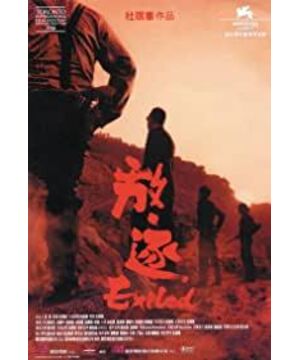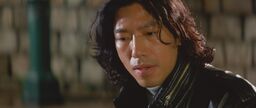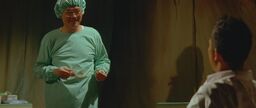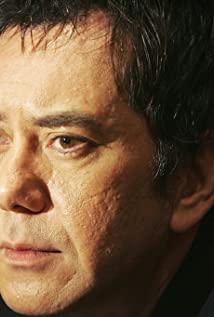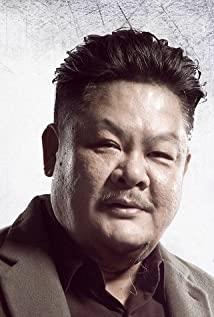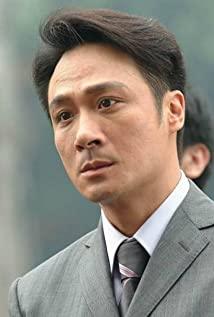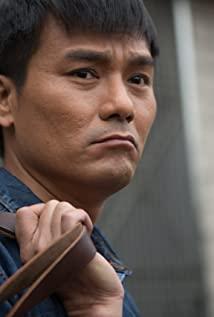Many people compare " Gunfire
" with "Exile", and even rudely believe that "Exile" is "Gunfire 2". It is true that many elements repeated in the two works do have the urge to confuse them: the precise and ruthless pistol shooting, the violent blood mist blooming on the characters, the tacit cooperation between men and brothers, and the men's conflict with each other. Games and women's play and pursuit. However, it would be too biased to interpret the two films as Du-Sir's repetitive expressions just because of these elements. Gunfire was filmed in 1999, while Exile was filmed in 2006. During this interval of seven years, Du Sir also filmed "PTU", "Big Man Has Great Wisdom", "Big Event", "Judo Dragon and Tiger List", as well as "Underworld 1, 2" in his personal career. ("Underworld 2" was also made in 2006. The background in the film is almost the same as that in "Exile": China drove out the colonial rulers of Hong Kong and Macau, and Hong Kong and Macau will "return to their mother's arms") . Du Sir has never stopped exploring his own boundaries, which can be seen in the unique shooting methods in "PTU" and "The Big Event": the former is all shot at night, and the entire movie is a fictional Kowloon district with a structure that meets the needs of the plot. ; And the long shot of the latter opening 6 minutes and 47 seconds is talked about. Since Du Sir is constantly advancing, why should he repeat his interpretation of masculinity after seven years? In fact, the completely different endings in the two films can be seen as Du Sir's thoughts on the ending of masculinity in different eras. In "Gun Fire", the five-member male brotherhood group experienced threats from women, and finally saved the day, and the bloodliness continued. And the men in "Exile", just because of the marriage and childbirth of He Zai, the bloody men who are happy and grudge only finally become a yellowed photo. From the beginning of the film, it appeared in the background sound, and the bell sound that runs through the beginning and the end turned out to be the soul-suppressing bell of the bloody men.
In fact, this kind of thinking about the end of male blood can also be seen from the English translation of the film. The English translations of most of Galaxy Imaging's films are quite intriguing: from the earlier "Birth of a Word" ("Too Many Ways To Be No.1"), to "The Mission", to "The Mission" "Breaking News". However, this "Exiled" turned out to be just a simple "Exiled". Unlike other intentions that can directly see the name in the movie, this "Exile", apart from Hezai who was in exile at the beginning, what else was exiled? From my point of view, Du Sir uses a relaxed and extremely neat lens language to tell a masculine tragedy of the exile of masculinity in the context of the times. And the imagery of Du Sir's film charm is subtly and intriguingly repeated again and again in the process. (A lot of spoilers for the following content)
The first paragraph: the first confrontation and resolution of the five brothers
The beginning is the confrontation between Huo and Fat Bo, Tai and Cat, and the two groups over the issue of execution and Zai. Talking about Shuyu is about to explain all the relationships between characters. The period also established the tone that the entire film has been repeating. Tai took the initiative to share cigars with Huo, who came to perform the mission, and in the following paragraphs, they tacitly shared food and wine; the five remained silent in the face of the upcoming shootout, and He Zai showed the revolver he was using. pistol, and then the other two withdrew the excess bullets from the magazine, making the remaining number of bullets also six; facing the police detective who was to retire and get by in three days, the cat chased him like a game with a can. Go; in the end, the five people sat down and completed the moving and cooking in a tacit and neat manner. During the period, except for two or three funny jokes, all the men silently enjoyed the blood and tacit understanding of each other. This intimacy is almost sympathetic. Even, surpassing the lover, the five became one body. The only thing out of place is the only woman: He Zai's wife. She had absolutely no idea what was going on. In fact, what stopped the shootout between Hezai, Huo, and Yutai was also because of the appearance of Hezai's wife: she started breastfeeding a starving baby. Among the deadlocked three, Huo's gun still had bullets, and He's bullets were all fired, leaving Tai only with the flying knife. Fire didn't really want to kill He, so he was slow to shoot. In the end, he gave up the idea of killing He because of a word from He Zai's wife: "Baby is hungry". The state of high stalemate is dissolved by the emergence of femininity. And during dinner, her slightly paused, worried eating action became a sign of the fate of the five of them: an imminent situation that will overwhelm the four of them.
The second paragraph: the brothers' reminiscence and night talk
After sharing the wine with the brothers, they sat down to discuss the solution. He proposes to raise a sum of money for his wife and children before resolving the grievance with the fire sent by Da Fei. In this paragraph, the interaction with his wife is also quite interesting. His wife Tonghe's brother failed to plead for mercy, and in order to relieve the fear in her heart, she began to drink heavily. But peacefully accompanying the child, he put on a string of bells for his child—a trinket that would become the heaviest burden in the future. At this time, the masculinity and femininity of the two people have been transformed to some extent: He's wife has chosen a masculine way of resolving, while He has chosen a more feminine way. The way the two responded to the upheaval also foreshadowed their different actions later.
Paragraph 3: Identifying Fundraising Tasks
Two threads intertwine at Shef's hotel. Here, too, is the usual dramatic use in Sir Du's films. Da Fei sent someone to kill He, but He and his brothers took over the task of killing Egg Roll Qiang from Da Fei. In fact, in connection with the subsequent plot, here is the interweaving of four clues. The other two are: the foreshadowing of Guanyin Mountain's robbery of gold, and, in the end, the complete victory of femininity. The prostitute who lived in the Shef Hotel looked on the opposite side of the men's busy mediation, ignoring all this, as if she already knew that the one who would win in the end would be her.
Du Sir used a very slow push of the mirror (1'50'') when Shaev and the five brothers explained the message (starting at 29'43''). The five brothers are like five static statues, and only Shef walks among the five, slowly revealing key information. The camera is slowly and imperceptibly approaching the five people who are considering the form in front of them. In the seemingly static footage, the tense drama tension is constantly accumulating, which must also indicate the importance of the subsequent gold robbery of Guanyin Mountain.
The fourth paragraph: The blood mist that bloomed in the first battle
of the Yayonghe Restaurant, the cooperation that did not need to be negotiated in advance, the just right help and mutual care, and the still shooting that dragged the ghosts and gods to cry. This is just another tacit show of the five brothers. After the whole shootout, He said a word: kill Dafei. He was still thinking about the fate of the fire that failed to carry out the mission. What Tai said is: collect the money first. His purpose is to kill the target guarantees and interests. After being shot in the fire (wearing a bulletproof vest, so he was not seriously injured), the whole person lost his judgment and could only end it afterwards.
The cat once again used the can to scare off the detective. However, what used to be reusable doesn't work this time. Before, when the truck couldn't start, a few brothers got out of the car and pushed the truck, which was simply a replica of the game in "Gun Fire" where a few stern killers kicked paper balls. And this time, the game can't solve the tricky situation at hand. For the first time, several people began to ask "where to go?"
From then on, all were exiled. Don't take another step back to the gang. The intention involved in the name of the movie is naturalized here, and the name and the substance are unified. The questioning of direction was repeatedly mentioned in the dialogue between the four brothers. Only Hezai, who is already familiar with the state of exile, has a clear goal: "go home". The others lost some of their composure, and Tai yelled at the fire. He lost his way at a crucial moment and was one of the reasons for the injury and serious injury.
The fifth paragraph: Encounter at a black market clinic
Du Sir's favorite "no coincidence is a book" dramatic approach: two groups of people went to the same black market clinic to seek medical treatment one after another after being burned and injured. The fierce battle in the narrow building is about to break out. The drapery that hangs all over the room intensifies the level of confrontation in the gunfight, and the fluttering of the drapery gives the entire chaotic shootout a graceful, hopeless romance—a perfect complement to the splattered blood. This scene always reminds me of the "Judo Dragon and Tiger List", after the negotiation of the four stations collapsed, the tables, chairs and benches flying around the room, and the characters fell methodically over the shoulders. In troubled times, heroes have their own ways to deal with it calmly, which makes people think of Du Sir's cigars.
He Zai was completely killed in this battle. The cause of death was a wind chime hanging from the doctor's window. In a trance, he thought he had returned to his child's side. He involuntarily left his brothers who fought for him. In the final analysis, the rise of femininity in He Zai was the most fundamental reason for his loss of life.
The four returned Hezai's body to his home. Hezai's wife takes another masculine action in response to Hezai's death: She shoots at Hezai's brothers before he died. After failing to shoot them, burn Hezai's body and set out on the road of revenge. She didn't even hesitate to give up the traditional women's action to deal with her deceased husband: take the orphans to die for love. The mixture of male and female temperament in He Zai cost him his life, and the mixture of male and female temperament in He Zai's wife also buried hidden dangers for the fate of the next four. In order to find the four who escaped, she fell into the clutches of Da Fei herself.
The sixth paragraph: Guanyin Mountain robs gold
The four who fled hurriedly dealt with their exile status. In the end, the way forward was handed over to the copper plate at hand. However, when they realized, the four had already reached the foot of Guanyin Mountain. The convoy carrying gold passed by in front of him like a formidable enemy. Fei Bo was the only one who obeyed his own nature: he took out his gun first, ready to fight. The remaining three still handed over the robbery to coins. The coin gave a negative answer, so the four embarked on a purposeless exile.
However, after just a few minutes, they were involved in a gunfight between another group of gold robbery teams and gold transport teams. The escort captain played by Ren Xianqi fought calmly, even enjoying himself. He smoked a cigarette in his spare time, reloaded his rifle slowly, and confidently eliminated a robber with one shot. The cat hiding in the grass even couldn't help applauding his marksmanship, and finally, regardless of the danger of exposing himself, used the mirror to reflect the sunlight to guide him to kill the enemy. In the end, the five reached a final settlement and ran with Jin together. They even shared cigarettes, just like they did when they first got together.
The superintendent played by Ren Xianqi was so masculine and handsome in this battle that it was impossible to ignore. Facing the hostility shown by his brothers to the sudden appearance of the Ranger, Huo took the initiative on the way to exile for the first time. He intervened and persuaded the superintendent to run away with his brothers with gold.
No one asked where to go for the rest of the journey. Even the brothers began to daydream comfortably. The four expressed their wish that they would come true after they got the reward of the robbery. All four have different aspirations—of course they will. But people can't help but re-examine the characters of the four people from their desires, and even, people can't help but guess: they are just the same person, playing the four different aspects of a person's character. Tai's desire is to eat, drink, and have fun, and he represents loyalty and intuition. Fire's wish is to study, he represents responsibility and direction, and he is also the one who flips a coin from beginning to end to determine the direction. Fei Bo's wish is to set up a small family, but he does not rule out the possibility of looking for flowers and willows. He represents people's animal instincts and desires - he is also a person who directly draws a gun and prepares to rob money. The cat's wish is to shoot the gun shop, he represents skill and chivalry - will cheer for marksmanship, and will sympathize with heroes. And the role of the ranger played by Ren Xianqi is the most envied role of the four. While the four brothers were laughing, he played the harmonica quietly. He was not exiled, it was he who actively exiled the world that entangled him. The fire extended an olive branch to the superintendent. On the one hand, it was the return of reason, allowing him to make the most rational actions. On the other hand, did he also see the heroic figure of the superintendent?
However, Da Fei would not let them go easily. He kidnaps He's wives and forces them back to Shef's hotel. And this time, in the face of the multiple-choice question of going or not going, Huo threw the coin directly and no longer struggled. He, no, they're back to the gritty rangers. Their spiritual banishment came to an end - at the cost of banishing their own lives.
The seventh paragraph: The final victory of femininity The
four returned to Shef's hotel, shared wine with pride, laughed at each other's ambush, and played the game of taking pictures without anyone else. In the end, he calmly faced his revenge with his wife, and silently faced the bell ringing on the feet of the baby in her arms - the soul bell of their bloody life.
It is worth noting that Da Fei, the villain, held a can of soft drink in his hand when he appeared, and the four brothers took spirits. Before the shootout began, the four brothers lifted the football with the cans thrown at them and ended the fight - still a game - before the can finally hit the ground.
In the end, it was the prostitute who had been hiding. She finally took the spoils - the gold nugget robbed by Guanyin Mountain. Bloody men leave game souvenirs - after the photos, their souls return to the West; the last laugh is a woman who walks among men with peace of mind and is ready to benefit from the fisherman at any time. In fact, this is the second time she has the last laugh in the film, the previous time she took away the medical bills earned by the doctor in the chaos, and the latter died in the chaos.
Of course, Ah He's wife also survived. So far, the bloody men in the movie have all died, while the women have all survived. Going back to the name of the movie, isn't it the lives of the bloody men who have been exiled? Why did the tough and flexible men in "Gunfire" fail to survive this time? Shef gave this answer intentionally or unintentionally in the hotel: It's a mess outside now, and the dynasty is changing... Did Du Sir give this background intentionally or unintentionally? The fact is that Du Sir has also set up this big back in other works ("Underworld 2"). As a Hong Konger who has deep feelings for Hong Kong society and culture, he is thinking about the changes that Hong Kong will face after the return of Hong Kong to the whole of Hong Kong. It is impossible for To Qifeng to not have his own understanding. In this "Exile", although the location is set in Macau, the drastic social and ideological changes caused by the "return" can be said to be similar to the situation in Hong Kong. And the result of Du Qifeng's final thinking is: the annihilation of the bloody boys representing the old Hong Kong gang, and the overall victory of women and motherhood.
But is this just thinking about gangs in Hong Kong culture, or thinking about Hong Kong movies, or is it the conclusion of thinking about the fate of Hong Kong? We don't know. But in the end, the tacit spirit of the men left in the movie is the charm that Sir Du and Hong Kong cannot exile.
View more about Exiled reviews


